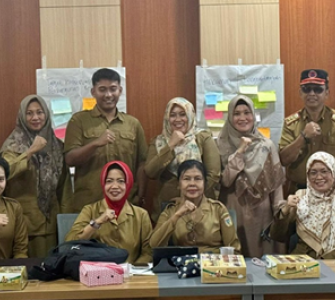As an archipelagic state, land degradation in Indonesia has a significant impact on the degradation of marine environments. The Government of Indonesia has become increasingly interested in the integrated management of terrestrial and coastal-marine areas in recent years. The SOLUSI project (Solutions for Integrated Land and Seascape Management in Indonesia) aims to develop and implement ecosystem-based methods for integrated land and sea management across Indonesia, ultimately fostering climate-resilient livelihoods. The project employs a holistic ‘reef-to-ridge’ approach, emphasizing the interconnectedness between terrestrial, watershed, and coastal marine environments. This integration is key to supporting Indonesia’s sustainable development.
The SOLUSI project, led by a consortium of GIZ, ICRAF, SNV, and Yayasan KEHATI Indonesia, prioritizes biodiversity conservation and ecological restoration. This includes strengthening ecosystem services, supporting sustainable economic growth through green and blue economies, and advancing Indonesia's sustainable development goals.
To meet one of the project’s main objectives, CSF has been entrusted to conduct a study on innovative financing mechanisms in three key provinces: Central Java (including Cilacap, Banyumas, and Kebumen), Central Sulawesi (Donggala, Palu City, Parigi Moutong, and Sigi), and Bangka Belitung (Belitung and East Belitung). These areas demonstrate tremendous variety and therefore have distinct investment needs. Bangka Belitung Province is home to large marine conservation areas, but struggles with tin mining activities. Central Sulawesi Province is a large coffee and cacao producer, as well as encompassing a reserve home to endemic flora, fauna, and significant water reserves. Finally, Central Java Province is characterized by rich coastal natural resources as well as a variety of agriculture and processing industries.
CSF will assist this project by conducting a land & seascape finance assessment for the 3 pilot areas and developing an innovative financing mechanism and investment strategy. Assessment will include relevant stakeholder mapping in the pilot areas, interviews with relevant consortium partners and local stakeholders in the 3 pilot areas.
The project has finished its interim report which presents an analysis of stakeholder roles and engagement, the effectiveness of existing financing mechanisms, and current budget allocations for sustainable development. Additionally, it explores the potential of natural resources, progress in implementing gender-responsive funding, and opportunities to integrate these findings into regional and national policies. These preliminary findings will continue to be refined through in-depth analysis, strategic discussions with various stakeholders, and verification processes to ensure that the recommendations are relevant, practical, and sustainable.
Photo: CSF Indonesia

